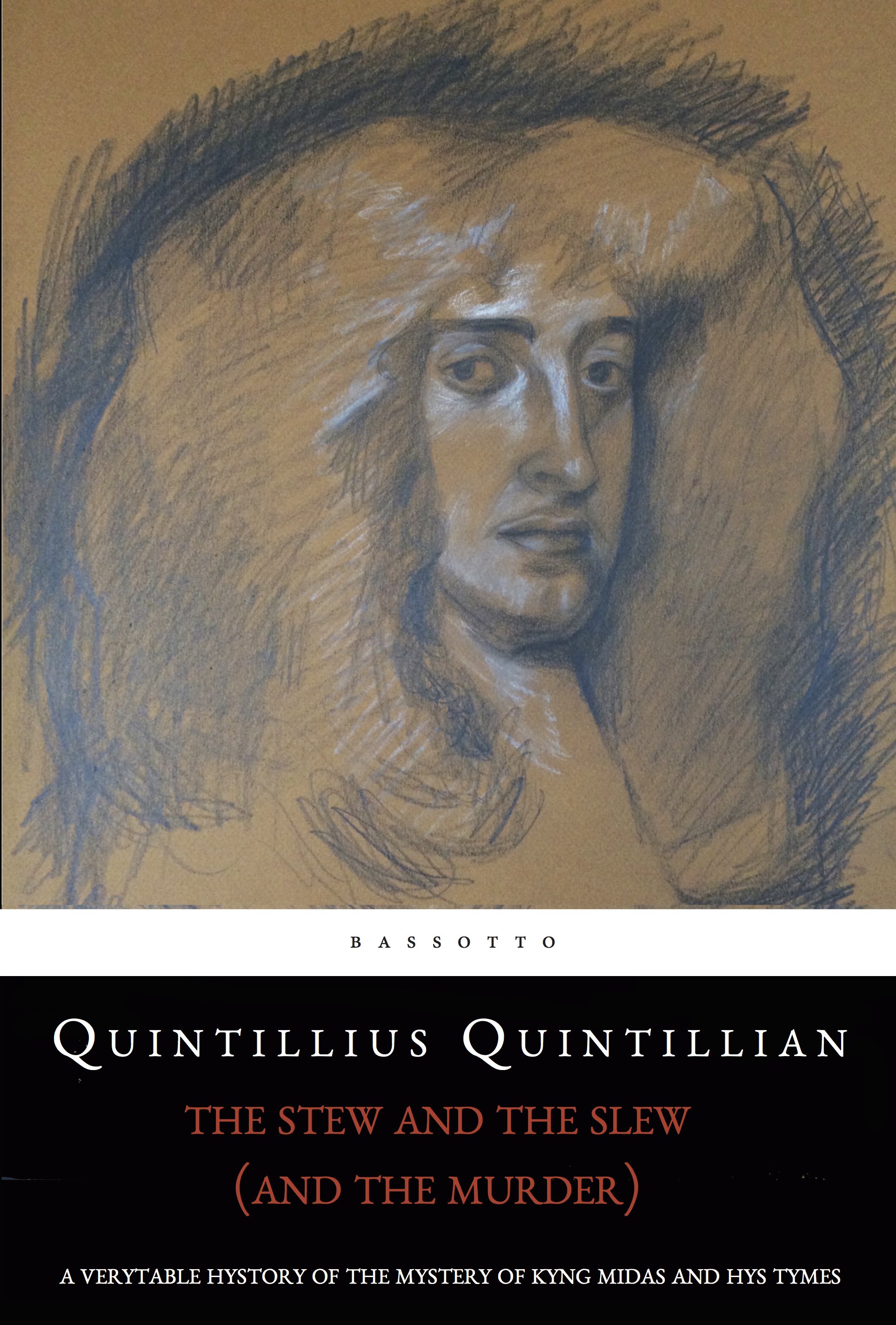Translator’s Introduction:
The Stew and the Slew and The Murder: A Verytable Hystory of the Mystery of Kyng Midas and Hys Tymes, is the translation of fragments of an original manuscript by Qunitillius Quintillian, originally titled Midas Rex: Et fumorum et vaporum.
Quintillius Quintillian was born in the little documented city of More, built on the River Tither, where he lived as an artist and musician, turning to writing during a period of political unrest. The city of More was razed to the ground many years after QQ’s death, during a war which raged for over 30 years, battling an invading army from the North, and most elements of the culture were burnt, destroyed or lost at this time, though a few manuscripts survive, a number of which have recently been discovered in various remote locations.
The city and the surrounding area were left with a people who had to rebuild the structures of the land, though much impoverished, and those who came after did not have the remnants or knowledge of the culture with which to educate themselves, but were left instead with stories handed down via word of mouth (since the majority of the population was now illiterate) containing secreted, though often distorted, information about the past and the dangers they faced as asociety cut off from their own resources.
The two manuscripts which comprise this newly uncovered work of Q.Quintillian were found in the last two years, one under a chapel on a hill in Italy, and the other in a monastery in the Swiss Alps and from these fragments the historian and translator has attempted to recreate and assemble something which might at least maintain some of the very particular character, and style of the work, and to find a structure whichcould be comprehensive in holding the pieces together in book form.
It seems evident that the work would have been seen as potentially damaging to the reputation of More, and it is thought that the author may even have remained in hiding after distributing the work, since there is no record of anything produced by Quintillius during the seven years that came after.
The city of More is said to have long been a place when there was little freedom to tell stories, to speak out or question the structures that be, and should perhaps lead us towards an appreciation of the need to actively protect such freedoms today.
In his own introduction to the work, QQ apologised for its fragmented and most unliterary style, claiming that he was not a writer, but it seemed that the task fell upon him to set down the work, stating that it “is a very stupid book, written by no less than an idiot who has difficulty finding his way with words, though who did not know how to bring attention to those things he felt to be important in any other way. The work is a mystery tale, its form to be interpreted, a kind of puzzle or perhaps game, to which the writer himself ultimately has no answer.”
The story gives an account of King Midas in a land (apparently one of many) which values the production of gold above all else, and the unforeseen consequences of this endeavour, for the individual, the society and the world at large. The book is comprised of a strange mixture of prose interspersed with some poetry, and though it appears at first to be a rather glib and grotesquely comical take on a society caught up in the pursuit of gold, (amidst the threat of a murder, to which the English translation of the title refers), underpinning the story one finds an obsession with food and the problematic, often horror- filled, attempt towards a somewhat deeper philosophical investigation into the machinations of society, and the nature of material existence itself.
The translator has taken it upon themselves to convert some of the proper names in the book, to provide an affectionate nod towards a province, home to the language in which the book is now re-written. The land here, is still the land of Midas, but the city is Lvnidom, or Luniciti (sometimes Midacity) built on the River Tymes, though it could equally have been named after other cities in other lands, places such as New Fork, Tokeno, Bling King, Shonkay, Frankengilder or others, and perhaps will be in future translations.
Rudolpho Popovic, (translator) Kippenberg, London 2016

